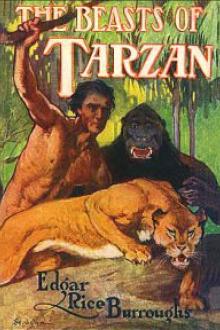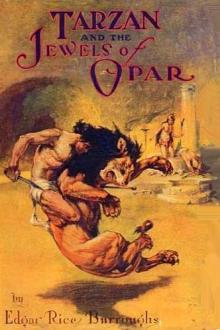Beasts of Tarzan by Edgar Rice Burroughs (best thriller books to read .txt) 📕

- Author: Edgar Rice Burroughs
- Performer: 0809599848
Book online «Beasts of Tarzan by Edgar Rice Burroughs (best thriller books to read .txt) 📕». Author Edgar Rice Burroughs
“If you are indeed a white man and a friend, we will let you come in; but first you must drive Sheeta away.”
“Very well,” replied Tarzan. “Listen, and you shall hear Sheeta fleeing before me.”
The ape-man returned quickly to the tree, and this time he made a great noise as he entered the branches, at the same time growling ominously after the manner of the panther, so that those below would believe that the great beast was still there.
When he reached a point well above the village street he made a great commotion, shaking the tree violently, crying aloud to the panther to flee or be killed, and punctuating his own voice with the screams and mouthings of an angry beast.
Presently he raced toward the opposite side of the tree and off into the jungle, pounding loudly against the boles of trees as he went, and voicing the panther’s diminishing growls as he drew farther and farther away from the village.
A few minutes later he returned to the village gate, calling to the natives within.
“I have driven Sheeta away,” he said. “Now come and admit me as you promised.”
For a time there was the sound of excited discussion within the palisade, but at length a half-dozen warriors came and opened the gates, peering anxiously out in evident trepidation as to the nature of the creature which they should find waiting there. They were not much relieved at sight of an almost naked white man; but when Tarzan had reassured them in quiet tones, protesting his friendship for them, they opened the barrier a trifle farther and admitted him.
When the gates had been once more secured the self-confidence of the savages returned, and as Tarzan walked up the village street toward the chief’s hut he was surrounded by a host of curious men, women, and children.
From the chief he learned that Rokoff had passed up the river a week previous, and that he had horns growing from his forehead, and was accompanied by a thousand devils. Later the chief said that the very bad white man had remained a month in his village.
Though none of these statements agreed with Kaviri’s, that the Russian was but three days gone from the chieftain’s village and that his following was much smaller than now stated, Tarzan was in no manner surprised at the discrepancies, for he was quite familiar with the savage mind’s strange manner of functioning.
What he was most interested in knowing was that he was upon the right trail, and that it led toward the interior. In this circumstance he knew that Rokoff could never escape him.
After several hours of questioning and cross-questioning the ape-man learned that another party had preceded the Russian by several days—three whites—a man, a woman, and a little man-child, with several Mosulas.
Tarzan explained to the chief that his people would follow him in a canoe, probably the next day, and that though he might go on ahead of them the chief was to receive them kindly and have no fear of them, for Mugambi would see that they did not harm the chief’s people, if they were accorded a friendly reception.
“And now,” he concluded, “I shall lie down beneath this tree and sleep. I am very tired. Permit no one to disturb me.”
The chief offered him a hut, but Tarzan, from past experience of native dwellings, preferred the open air, and, further, he had plans of his own that could be better carried out if he remained beneath the tree. He gave as his reason a desire to be close at hand should Sheeta return, and after this explanation the chief was very glad to permit him to sleep beneath the tree.
Tarzan had always found that it stood him in good stead to leave with natives the impression that he was to some extent possessed of more or less miraculous powers. He might easily have entered their village without recourse to the gates, but he believed that a sudden and unaccountable disappearance when he was ready to leave them would result in a more lasting impression upon their childlike minds, and so as soon as the village was quiet in sleep he rose, and, leaping into the branches of the tree above him, faded silently into the black mystery of the jungle night.
All the balance of that night the ape-man swung rapidly through the upper and middle terraces of the forest. When the going was good there he preferred the upper branches of the giant trees, for then his way was better lighted by the moon; but so accustomed were all his senses to the grim world of his birth that it was possible for him, even in the dense, black shadows near the ground, to move with ease and rapidity. You or I walking beneath the arcs of Main Street, or Broadway, or State Street, could not have moved more surely or with a tenth the speed of the agile ape-man through the gloomy mazes that would have baffled us entirely.
At dawn he stopped to feed, and then he slept for several hours, taking up the pursuit again toward noon.
Twice he came upon natives, and, though he had considerable difficulty in approaching them, he succeeded in each instance in quieting both their fears and bellicose intentions toward him, and learned from them that he was upon the trail of the Russian.
Two days later, still following up the Ugambi, he came upon a large village. The chief, a wicked-looking fellow with the sharp-filed teeth that often denote the cannibal, received him with apparent friendliness.
The ape-man was now thoroughly fatigued, and had determined to rest for eight or ten hours that he might be fresh and strong when he caught up with Rokoff, as he was sure he must do within a very short time.
The chief told him that the bearded white man had left his village only the morning before, and that doubtless he would be able to overtake him in a short time. The other party the chief had not seen or heard of, so he said.
Tarzan did not like the appearance or manner of the fellow, who seemed, though friendly enough, to harbour a certain contempt for this half-naked white man who came with no followers and offered no presents; but he needed the rest and food that the village would afford him with less effort than the jungle, and so, as he knew no fear of man, beast, or devil, he curled himself up in the shadow of a hut and was soon asleep.
Scarcely had he left the chief than the latter called two of his warriors, to whom he whispered a few instructions. A moment later the sleek, black bodies were racing along the river path, up-stream, toward the east.
In the village the chief maintained perfect quiet. He would permit no one to approach the sleeping visitor, nor any singing, nor loud talking. He was remarkably solicitous lest his guest be disturbed.
Three hours later several canoes came silently into view from up the Ugambi. They were being pushed ahead rapidly by the brawny muscles of their black crews. Upon the bank before the river stood the chief, his spear raised in a horizontal position above his head, as though in some manner of predetermined signal to those within the boats.
And such indeed was the purpose of his attitude—which meant that the white stranger within his village still slept peacefully.
In the bows of two of the canoes were the runners that the chief had sent forth three hours earlier. It was evident that they had been dispatched to follow and bring back this party, and that the signal from the bank was one that had been determined upon before they left the village.
In a few moments the dugouts drew up to the verdure-clad bank. The native warriors filed out, and with them a half-dozen white men. Sullen, ugly-looking customers they were, and none more so than the evil-faced, black-bearded man who commanded them.
“Where is the white man your messengers report to be with you?” he asked of the chief.
“This way, bwana,” replied the native. “Carefully have I kept silence in the village that he might be still asleep when you returned. I do not know that he is one who seeks you to do you harm, but he questioned me closely about your coming and your going, and his appearance is as that of the one you described, but whom you believed safe in the country which you called Jungle Island.
“Had you not told me this tale I should not have recognized him, and then he might have gone after and slain you. If he is a friend and no enemy, then no harm has been done, bwana; but if he proves to be an enemy, I should like very much to have a rifle and some ammunition.”
“You have done well,” replied the white man, “and you shall have the rifle and ammunition whether he be a friend or enemy, provided that you stand with me.”
“I shall stand with you, bwana,” said the chief, “and now come and look upon the stranger, who sleeps within my village.”
So saying, he turned and led the way toward the hut, in the shadow of which the unconscious Tarzan slept peacefully.
Behind the two men came the remaining whites and a score of warriors; but the raised forefingers of the chief and his companion held them all to perfect silence.
As they turned the corner of the hut, cautiously and upon tiptoe, an ugly smile touched the lips of the white as his eyes fell upon the giant figure of the sleeping ape-man.
The chief looked at the other inquiringly. The latter nodded his head, to signify that the chief had made no mistake in his suspicions. Then he turned to those behind him and, pointing to the sleeping man, motioned for them to seize and bind him.
A moment later a dozen brutes had leaped upon the surprised Tarzan, and so quickly did they work that he was securely bound before he could make half an effort to escape.
Then they threw him down upon his back, and as his eyes turned toward the crowd that stood near, they fell upon the malign face of Nikolas Rokoff.
A sneer curled the Russian’s lips. He stepped quite close to Tarzan.
“Pig!” he cried. “Have you not learned sufficient wisdom to keep away from Nikolas Rokoff?”
Then he kicked the prostrate man full in the face.
“That for your welcome,” he said.
“Tonight, before my Ethiop friends eat you, I shall tell you what has already befallen your wife and child, and what further plans I have for their futures.”
Through the luxuriant, tangled vegetation of the Stygian jungle night a great lithe body made its way sinuously and in utter silence upon its soft padded feet. Only two blazing points of yellow-green flame shone occasionally with the reflected light of the equatorial moon that now and again pierced the softly sighing roof rustling in the night wind.
Occasionally the beast would stop with high-held nose, sniffing searchingly. At other times a quick, brief incursion into the branches above delayed it momentarily in its steady journey toward the east. To its sensitive nostrils came the subtle unseen spoor of many a tender four-footed creature, bringing the slaver of hunger to the cruel, drooping jowl.
But steadfastly it kept on its way, strangely ignoring the cravings of appetite that at another time would have sent the rolling, fur-clad muscles flying at some soft throat.
All that night the creature pursued its lonely way, and the next day it





Comments (0)